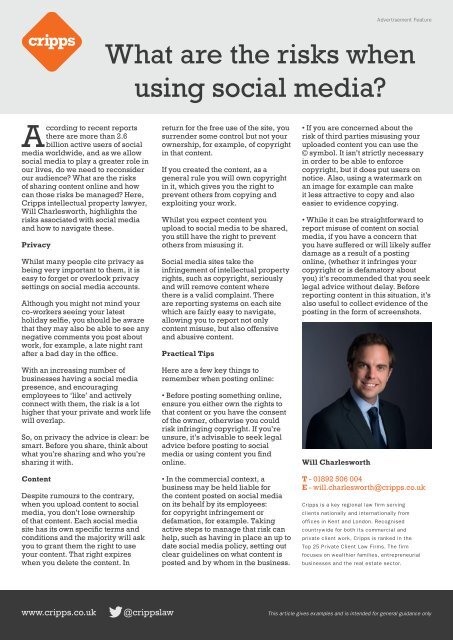Wealden Times | WT177 | November 2016 | Christmas Gifts supplement inside
Wealden Times - The lifestyle magazine for the Weald
Wealden Times - The lifestyle magazine for the Weald
You also want an ePaper? Increase the reach of your titles
YUMPU automatically turns print PDFs into web optimized ePapers that Google loves.
Advertisement Feature<br />
What are the risks when<br />
using social media?<br />
According to recent reports<br />
there are more than 2.6<br />
billion active users of social<br />
media worldwide, and as we allow<br />
social media to play a greater role in<br />
our lives, do we need to reconsider<br />
our audience? What are the risks<br />
of sharing content online and how<br />
can those risks be managed? Here,<br />
Cripps intellectual property lawyer,<br />
Will Charlesworth, highlights the<br />
risks associated with social media<br />
and how to navigate these.<br />
Privacy<br />
Whilst many people cite privacy as<br />
being very important to them, it is<br />
easy to forget or overlook privacy<br />
settings on social media accounts.<br />
Although you might not mind your<br />
co-workers seeing your latest<br />
holiday selfie, you should be aware<br />
that they may also be able to see any<br />
negative comments you post about<br />
work, for example, a late night rant<br />
after a bad day in the office.<br />
With an increasing number of<br />
businesses having a social media<br />
presence, and encouraging<br />
employees to ‘like’ and actively<br />
connect with them, the risk is a lot<br />
higher that your private and work life<br />
will overlap.<br />
So, on privacy the advice is clear: be<br />
smart. Before you share, think about<br />
what you’re sharing and who you’re<br />
sharing it with.<br />
Content<br />
Despite rumours to the contrary,<br />
when you upload content to social<br />
media, you don’t lose ownership<br />
of that content. Each social media<br />
site has its own specific terms and<br />
conditions and the majority will ask<br />
you to grant them the right to use<br />
your content. That right expires<br />
when you delete the content. In<br />
return for the free use of the site, you<br />
surrender some control but not your<br />
ownership, for example, of copyright<br />
in that content.<br />
If you created the content, as a<br />
general rule you will own copyright<br />
in it, which gives you the right to<br />
prevent others from copying and<br />
exploiting your work.<br />
Whilst you expect content you<br />
upload to social media to be shared,<br />
you still have the right to prevent<br />
others from misusing it.<br />
Social media sites take the<br />
infringement of intellectual property<br />
rights, such as copyright, seriously<br />
and will remove content where<br />
there is a valid complaint. There<br />
are reporting systems on each site<br />
which are fairly easy to navigate,<br />
allowing you to report not only<br />
content misuse, but also offensive<br />
and abusive content.<br />
Practical Tips<br />
Here are a few key things to<br />
remember when posting online:<br />
• Before posting something online,<br />
ensure you either own the rights to<br />
that content or you have the consent<br />
of the owner, otherwise you could<br />
risk infringing copyright. If you’re<br />
unsure, it’s advisable to seek legal<br />
advice before posting to social<br />
media or using content you find<br />
online.<br />
• In the commercial context, a<br />
business may be held liable for<br />
the content posted on social media<br />
on its behalf by its employees:<br />
for copyright infringement or<br />
defamation, for example. Taking<br />
active steps to manage that risk can<br />
help, such as having in place an up to<br />
date social media policy, setting out<br />
clear guidelines on what content is<br />
posted and by whom in the business.<br />
• If you are concerned about the<br />
risk of third parties misusing your<br />
uploaded content you can use the<br />
© symbol. It isn’t strictly necessary<br />
in order to be able to enforce<br />
copyright, but it does put users on<br />
notice. Also, using a watermark on<br />
an image for example can make<br />
it less attractive to copy and also<br />
easier to evidence copying.<br />
• While it can be straightforward to<br />
report misuse of content on social<br />
media, if you have a concern that<br />
you have suffered or will likely suffer<br />
damage as a result of a posting<br />
online, (whether it infringes your<br />
copyright or is defamatory about<br />
you) it’s recommended that you seek<br />
legal advice without delay. Before<br />
reporting content in this situation, it’s<br />
also useful to collect evidence of the<br />
posting in the form of screenshots.<br />
Will Charlesworth<br />
T - 01892 506 004<br />
E - will.charlesworth@cripps.co.uk<br />
Cripps is a key regional law firm serving<br />
clients nationally and internationally from<br />
offices in Kent and London. Recognised<br />
countrywide for both its commercial and<br />
private client work, Cripps is ranked in the<br />
Top 25 Private Client Law Firms. The firm<br />
focuses on wealthier families, entrepreneurial<br />
businesses and the real estate sector.<br />
www.cripps.co.uk @crippslaw This article gives examples and is intended for general guidance only


















